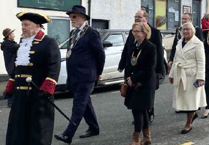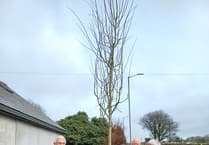TWO kayakers attempting to reach Looe Island in rough sea conditions were rescued from two different locations.
Looe RNLI volunteer crew pagers sounded for the first time in 2021 at 6.12pm on Monday evening, following reports of two kayakers in difficulties between Looe Island and Hannafore.
With one kayaker reported to be on the island beach, cold and wet, and the first informant saying they had lost sight of the other kayaker, Lifeboat Operations Manager Dave Haines decided to launch both inshore lifeboats.
Within 12 minutes, head launcher Brain Bowdler, tractor drivers David Mitchell and Del Palfrey, together with shore crew Richard Jones and Eric Candy, were launching the charity’s Atlantic 85 Sheila and Dennis Tongue II and D Class Ollie Naismith.
An RNLI spokesman said: "It was a bitterly cold, dark evening with strong easterly force 5-6 winds as the Atlantic 85 helmed by Clive Palfrey left the river and headed towards Looe Island.
"On transit to the island, crew members Tom Peat, Victoria Thomas and Goron Jones were keeping a lookout for the second kayaker.
"Arriving on scene at the island beach, Tom Peat went ashore to check on the first casualty, who was with the island’s warden, whilst the Atlantic continued with the search for the second kayaker.
"Meanwhile, the crew on the D Class - Toby Bray, Dan Margetts and Matt Jaycock - had been tasked to conduct a shoreline search along Hannafore beach.
"Shortly after, Looe coastguard rescue team reported they had found the second kayaker on shore at Hannafore."
The D Class headed to the island beach to bring the other kayaker back to Hannafore. With both casualties in the care of the Looe Coastguard team, the lifeboats returned to station.
The spokesman said: "It transpires that one of the kayakers lost their paddle and capsized.
"With the kayak taking in water, they were unable to get back into the craft. The other kayaker towed the capsized kayak towards the island, when they reached rocks off the beach, the second kayaker then headed for Hannafore."
After the shout, several of the volunteer boat crew commented that the kayakers were extremely lucky to have been spotted in the darkness. The spokesman added: "With the rough sea conditions, strong easterly winds and outgoing tidal currents, they could have easily been blown out to sea.
"When you end up in cold water, unexpectedly things can go very wrong, very quickly, with tragic consequences."
The RNLI urges everyone to think carefully about using the sea for exercise or recreation in case you get into difficulty.
When volunteer crews are called to an incident, it puts additional pressure on them and other frontline emergency services, as well as potentially exposing them to COVID-19.
• Be aware of the weather and sea conditions and your own capabilities and only enter the water if it is safe to do so
• Take a method of calling for help, preferably a VHF radio or full-charged phone in a waterproof pouch
• Check the tide times
• If going afloat, always wear a lifejacket or other personal flotation device
• In an emergency call 999 or 112 and ask for the Coastguard




